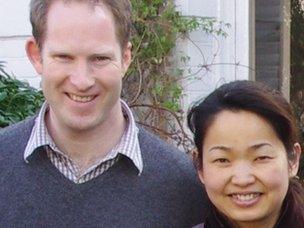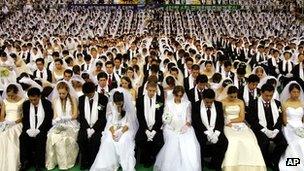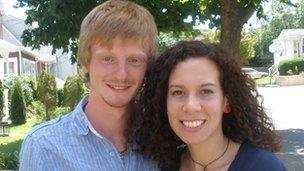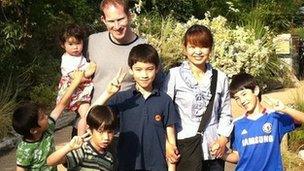Moon’s rising son spells change for the Unification Church
- Published

Simon Cooper and his Japanese wife Cheiko were matched by Mr Moon
When Simon Cooper married his Japanese wife Cheiko 18 years ago it was a match made, if not in heaven, at least by the Reverend Sun Myung Moon.
In those days Mr Moon "matched" thousands of young people for the kind of mass weddings the Unification Church he founded is celebrating on Saturday in South Korea.
He occupies the position of a messiah for the church, with his account of having been visited as a teenager by Jesus, who told him that God wanted him to restore his kingdom on earth.
Mr and Mrs Cooper now have five children, and he has been made a pastor in the church, and chief executive at its British headquarters in London.
"It was pouring with rain but it was surprisingly a very romantic and also spiritual experience, and I remember standing there with Cheiko and it feeling incredibly intimate," he recalls of the mass wedding in 1995.
That was despite the tens of thousands of other couples, either getting married for the first time or renewing their vows in the presence of Mr Moon.
Video footage from the era of the Coopers' wedding shows Mr Moon, and his wife Hak Ja Han, dressed in white robes and wearing crowns, at the centre of the ceremony.
The couple - known by many in the Unification Church as "the true spiritual parents of humankind" - witness the vows called out in a great roar by the ranks of brides and grooms.
Members of the church - many dislike the term "Moonies" - say the success of those marriages speaks for itself.
The figures are hard to assess, but the British branch of the Family Federation for World Peace and Unification claims a divorce rate far lower than the population at large.

Mass weddings are central to the church, which sees marriage as an essential part of life
Mr Cooper describes how his family were initially "not particularly keen" on the prospect of Mr Moon matching him with a woman he had met only once.
But Mr Cooper, like other couples, had faith in the leader's wisdom.
These days couples are more likely to be introduced by their respective families, and Mr Moon's role is a little less pivotal.
Daniel Pollitt, a 22-year-old student from Kent University, is in Korea to marry Dawn, the American found for him by his parents.
The couple have met only three times before their wedding, but they have spent hours in daily conversations on Skype.
Mr Pollitt says the church has been modernising, and is less dependent on 92-year-old Mr Moon.
"He's quite an inspirational figure but ultimately it's down to what I believe, and that won't change if he passes away…. I feel it's already kind of been adapting to the times," says Mr Pollitt.
Changing times have seen members of the church continuing to appeal to Mr Moon for spiritual and practical guidance, but the leader himself increasingly refers to the church's traditions.
These are partly expressed in the book called "Divine Principle", which contains the revelations received by Mr Moon, and forms the basis of Unification theology.

Daniel Pollitt's parents found his American bride, Dawn, for him
Another development has been the increased influence of Mr Moon's younger son, Hyung Jin Moon - selected by him a few years ago to take over the spiritual leadership of the church.
Mr Cooper says Hyung Jin Moon, who studied at Harvard, practised Buddhism and lived for a time in a Roman Catholic monastery, is having an effect on congregations in the UK.
"He was doing things that maybe hadn't been done in services before, such as encouraging people to go over to another person and give them a hug. He was bringing his own flavour to the worship culture, and that said to a lot of people 'why don't we all try to do things to develop our worship culture, and no just do things as they've always been done'," he said.
Experts in new religious movements, such as Dr George Chryssides, an honorary research fellow at Birmingham University, have monitored what he regards as experimentation in the church as it loosens the apron strings connecting it to the founder.
"The Unification Church has been very volatile. They keep trying out new ideas and changing, and it's often difficult to see which way it's going," he said.

Mr Cooper and his wife now have five children
Dr Chryssides believes the changes have so far failed to establish a firm footing for any transition to life after Moon, partly because of divisions in the family over the future of its considerable business portfolio.
He says: "Moon is trying to hold things together as best he can but there are legal battles going on for control of the organisation… the various properties that Moon has an interest in. If you look at the history of religious movements, the person who gets the assets is key to how the organisation develops."
Mr Cooper acknowledges that the rift between two of Mr Moon's sons is a problem for the church, and it needs to be resolved before he dies.
"It's good that these disagreements and these family conflicts get sorted out or resolved while he is still alive because it creates a much stronger potential for how things will develop after he passes away", he says.
One thing that is likely to continue, at least for a time, are the mass weddings, with their white and black sea of brides and grooms.

The giant church at Cheongshim in Korea where the mass weddings take place
Marriage remains central in a theology which emphasises family values, and which teaches that only the married can achieve ultimate salvation.
One of the church's aims is to unite Christians from different countries, and it is likely to continue joining couples from opposite sides of the world.
Also, as Mr Pollitt explains, the weddings are "the only real kind of sacrament (ritual revealing God in people's lives), the only real ceremony or big event that we have together and which is official".
Mr Cooper, one of the Unification Church's new breed of younger pastors, presides over services in Lancaster Gate in London which have an informal, evangelical, feel.
A band of three 20-somethings leads the congregation in worship songs, and there are prayers for the "true parents" and for the blessing ceremony in Korea.
Speaking at a lectern, near a photograph of Mr Moon and his wife, Mr Cooper preaches a sermon about making the best use of time.
"God has plans for us but we have to do our share to make them come about," he tells the congregation.
But as, over time, the true parents fade from the scene, unificationists cannot be sure where those plans will take their church.